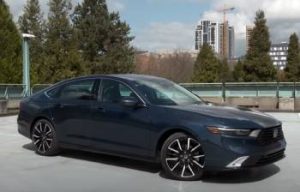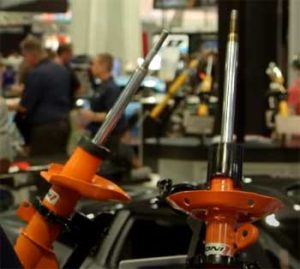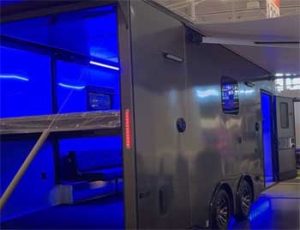So you’re stuck between a rock and a hard place: Honda CR-V or Subaru Outback? These aren’t just cars; they’re practically rolling emblems of your lifestyle choices.
One whispers adventure and the other screams practicality, but which one should you call “mine”? Allow me to help you unravel this web by putting these two titans head-to-head.
A Brief Comparison Table
| Feature Category | Honda CR-V | Subaru Outback |
| Engine Options | 1.5L turbocharged 4-cylinder | Base 2.5L 4-cylinder, Optional 2.4L turbocharged 4-cylinder |
| Drive System | Front-wheel drive, optional all-wheel drive | Standard all-wheel drive |
| Fuel Efficiency (MPG) | Up to 28 city / 34 highway | Up to 26 city / 33 highway |
| Cargo Space (cu ft) | Up to 75.8 | Up to 75.7 |
| Safety Systems | Honda Sensing available | EyeSight Driver Assist standard |
| Infotainment Screen | Up to 7-inch | Up to 11.6-inch |
| Smartphone Integration | Apple CarPlay and Android Auto available | Standard Apple CarPlay and Android Auto |
| Base Price | Starts around $25,000 | Starts around $27,000 |
| Resale Value | Generally higher | Competitive but slightly lower |
Under the Hood
Honda CR-V
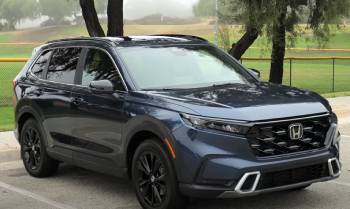
Pros:
- Fuel Efficiency:
Let’s start with the fact that Honda CR-V boasts superb fuel economy. For city dwellers and long commuters, this is a dream come true.
- Smooth Ride:
The CR-V ensures you travel like royalty; its suspension absorbs bumps in the road as if they were marshmallows.
- Reliability:
Honda’s are known for their longevity. Your CR-V might outlast the last cockroach.
Cons:
- Less Off-Road Ready:
Unlike the Subaru, it’s not bred for off-road escapades.
- Price:
Sometimes a little heftier on the wallet for additional features.
Also Read: Differences Between Green And Gray Tint Privacy.
Subaru Outback
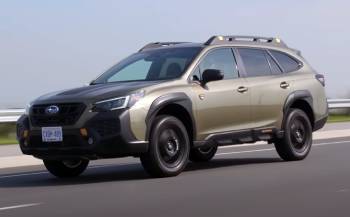
Pros:
- Off-Road Capability:
The Subaru Outback is practically begging you to take it on an adventure. Thanks to its all-wheel-drive, this vehicle can navigate through rain, mud, and more.
- Spacious Interior:
More room means more space for that camping gear or those shopping bags.
- Safety Features:
Subaru’s EyeSight Driver Assist Technology comes standard, and let’s be real, who doesn’t like an extra pair of eyes on the road?
Cons:
- Fuel Efficiency:
While not terrible, it’s not as pocket-friendly in the long run as the Honda CR-V when it comes to fuel costs.
- Initial Cost:
Subaru’s features come with a price tag. This isn’t your budget-friendly option.
Interior and Tech Savvy
Honda CR-V
Pros:
- Space Efficiency:
If you have kids, the roomy backseat will prevent World War III from breaking out between Timmy and Sarah.
- Cargo Space:
The rear seats fold down flatter than a pancake, making it easy to transport almost anything.
Cons:
- Infotainment:
It’s functional but can be slightly confusing at first.
Subaru Outback
Pros:
- Tech Features:
Subaru’s infotainment system is like the iPhone of cars — intuitive, sleek, and with Apple CarPlay and Android Auto as standard.
Cons:
- Manual Seats:
In lower trims, power-adjustable seats are a no-show. You’ll have to adjust the old-fashioned way.
Resale Value
Honda CR-V
- Higher Resale Value:
Hondas traditionally hold their value well, so you can sell your CR-V for a decent amount when it’s time to upgrade.
Subaru Outback
- Competitive Resale Value:
Subarus also maintain a good resale value, although generally not as high as Hondas.
Honda CR-V vs Subaru Outback: A Deep Dive into Key Differences
Okay, let’s get into the nitty-gritty! You’ve read about their basic pros and cons, but you’re hungry for more detail, right? Here’s a comprehensive breakdown that dissects key areas, from engine performance to safety features.
Engine Performance
Honda CR-V
Pros:
- Turbocharged Engine: The optional 1.5-liter turbocharged four-cylinder engine is zippy, responsive, and well-suited to most driving conditions.
- Efficiency: Honda has honed its powertrains to be fuel-efficient. In the city and on highways, the CR-V delivers impressive miles per gallon (MPG).
Cons:
- Not Off-Road Worthy: While adequate for most terrains, the CR-V’s engine isn’t optimized for heavy off-road use.
Subaru Outback
Pros:
- Base and Turbo Options: The Outback gives you the choice between a decent base engine and a more powerful turbocharged engine.
- All-Wheel Drive: All-wheel-drive comes standard, making it versatile across various terrains and weather conditions.
Cons:
- Lower Fuel Efficiency: While not a gas guzzler, the Outback can’t compete with the CR-V in fuel efficiency.
Cargo Space and Interior Comfort
Honda CR-V
Pros:
- Well-Designed Space: The CR-V uses its interior dimensions effectively, providing plenty of storage nooks and crannies.
- Adult-Friendly Back Seat: The rear seats provide enough headroom and legroom to keep adults comfortable on long rides.
Cons:
- Basic Base Trim: The base trim level’s interior looks and feels a little more “budget” than you might like.
Subaru Outback
Pros:
- Roof Rails: Standard roof rails make it easy to load bikes, kayaks, or a roof box.
- Premium Materials: The Outback feels a bit more “upscale” with available leather upholstery and heated seats.
Cons:
- Less Headroom: The Outback’s sloping roofline can eat into rear headroom, especially for taller passengers.
Safety Features
Honda CR-V
- Honda Sensing: Available as an optional package, Honda Sensing offers adaptive cruise control, lane-keeping assist, and collision mitigation braking.
Subaru Outback
- EyeSight Driver Assist: Subaru’s EyeSight package comes standard, featuring adaptive cruise control, pre-collision braking, lane departure, and sway warning.
Tech Amenities
Honda CR-V
Pros:
- Apple CarPlay and Android Auto: Available in most trims, allowing for easy smartphone integration.
Cons:
- No Standard Satellite Radio: You’ll need to upgrade from the base model to get SiriusXM.
Subaru Outback
Pros:
- Bigger Touchscreen: The available 11.6-inch vertical touchscreen is a centerpiece, providing easy access to various controls.
Cons:
- Slower Response: The infotainment system can sometimes be less responsive than you’d like.
Also Read: Differences Between Avery Dennison And XPEL PPF.
Frequently Asked Questions (FAQs)
Subaru and Honda both have strong reputations for reliability. However, Honda has a slight edge due to its historical track record of longevity and fewer repairs.
The Subaru Outback offers more cargo space and is generally larger, making it a better option for those who need the extra room.
Both are reliable brands but Honda usually gets a nod for being more reliable over the long term.
The Subaru Forester is the closest equivalent to the Honda CR-V in the Subaru line-up.
This depends on what you’re looking for. If you want more luxury, consider the Audi Q5. For off-road prowess, look at the Jeep Grand Cherokee.
The Honda CR-V and Toyota RAV4 are close in dimensions, but the CR-V is generally a tad longer, offering a bit more cargo space.
Conclusion
Choosing between the Honda CR-V and Subaru Outback boils down to your lifestyle and what you need in a car. The CR-V is the king of daily commuting, offering fuel efficiency and a smooth ride. The Outback is your go-to for weekend adventures, safety, and spacious interiors. Either way, you’re making a solid choice. So are you Team CR-V or Team Outback? Time to pick your champion.
In essence, if you’re in for efficient daily commuting and high resale value, the Honda CR-V is your jam. If adventures, safety, and tech top your list, then the Subaru Outback beckons. Now that you’re armed with a wealth of information, which contender wins your hard-earned dollar?

